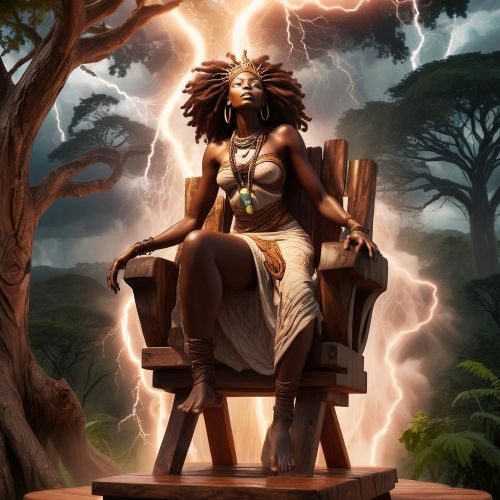Ijaw Mythology
Ijaw mythology, rooted in the traditions of the Ijaw people of Nigeria’s Niger Delta, is one of the most profound and nature-centered cosmologies of West Africa. Surrounded by rivers, mangroves, and the vast Atlantic Ocean, the Ijaw developed a spiritual worldview that mirrors the watery landscape they inhabit. Their myths express the belief that water is the origin of life, and that all existence flows from and returns to the divine energies that dwell within it. The Ijaw see the world as a sacred balance between the spiritual and material realms — a living ecosystem animated by gods, ancestors, and the forces of nature.
At the heart of Ijaw mythology lies the supreme creator Woyingi, also known as Egbesu or Tamuno in different traditions. Woyingi is the mother of all creation — a powerful, nurturing, and enigmatic goddess who gave birth to both gods and humans. According to Ijaw creation stories, in the beginning there was only water and the sky. Woyingi descended from the heavens, shaped the land, and molded the first humans from the earth beneath the waves. After breathing life into them, she gave each person a spiritual double, or teme, and the freedom to choose their destiny before being born into the world. This belief in preexistence and personal choice reflects a deep philosophical understanding of life, fate, and moral responsibility.
The Ijaw pantheon includes a wide range of deities associated with nature, justice, and protection. Chief among them is Egbesu, the god of war, morality, and divine justice. Egbesu embodies courage, order, and resistance against wrongdoing, serving as both protector and avenger. Historically, Ijaw warriors invoked Egbesu for strength and righteousness in battle, believing that moral purity granted spiritual invincibility. The water deities, collectively called Owuamapu, govern rivers, tides, and fertility, while the spirits of the ancestors maintain harmony between the living and the divine. In the Ijaw worldview, no aspect of nature is devoid of spirit — rivers breathe, trees whisper, and the ocean is alive with the memory of creation.
Ijaw mythology also includes powerful moral and symbolic tales that explain the origins of social customs, gender balance, and natural phenomena. One story tells of Woyingi’s judgment, when humans were asked whether they preferred eternal life without suffering or a mortal life of struggle and renewal. Humanity chose mortality — a decision that granted meaning to existence but introduced hardship and death. Such myths reveal the Ijaw view that suffering is part of the divine cycle of growth, renewal, and transformation.
Rituals, songs, and masquerades remain vital to Ijaw religious expression. Sacred ceremonies often take place by riversides or in forest shrines, accompanied by drumming, chants, and symbolic dances that reenact creation and ancestral communion. These performances are not mere traditions but living prayers that keep the bond between humans, spirits, and nature alive.
Ijaw mythology continues to influence modern cultural identity across the Niger Delta. It embodies ecological wisdom, gender balance, and the principle of justice that runs through both human and divine law. To the Ijaw, the world remains what it has always been — a sacred river of life, flowing between the realms of spirit and earth, where creation is a song that never ends.


